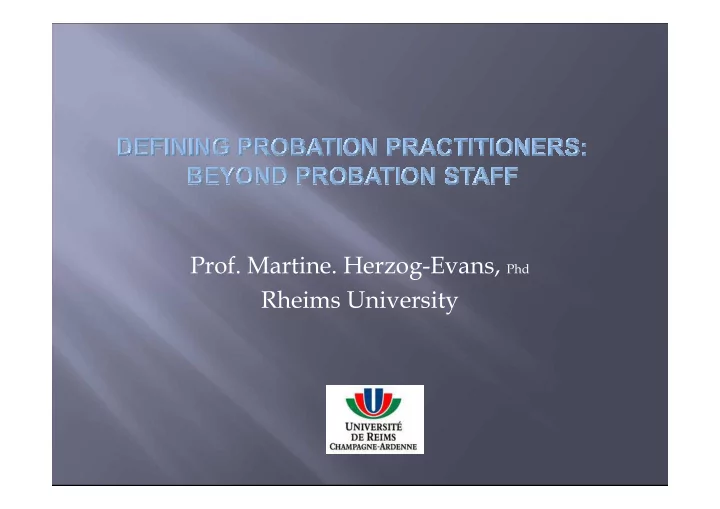

Prof. Martine. Herzog-Evans, Phd Rheims University
� History: volunteers � Current trends: � - privatisation & the return of the Third sector � - ‘polibation’ � - citizens’ participation (e.g. COSA) � - problem-solving courts �
� Context: � - French 68 year old judicial participation in probation and release: jug e de l’application des peines (J.A.P.) � - five years research into ‘who works in supervision’ (probation officers/JAP…. attorneys) – to be continued (clerks’ office, prosecutors, prison guards…) � Question: what can possibly be the role of judges and attorneys in probation? Is there an added bonus?
� 1) legitimacy of justice literature, following TYLER (2012) � - ‘People want to have a forum in which they can tell their story � -‘people react to evidence that the authorities with whom they are dealing are neutral’. � ‘people are ‘sensitive to whether they are treated with dignity and politeness and to whether their rights as citizens are respected’ � ‘people focus on cues that communicate information about the intentions and character of the legal authority with whom they are dealing’
� 2) Rituals literature � = Maruna, Tait and French authors Garapon and Desprez � Have all showed how important judicial rituals were. Maruna has focused on judicial desistance rituals. � 3) Compliance literature Fairness matters + Raynor (2013) = compliance interviews in Jersey = French ‘recadrages’ � 4) Desistance literature � = collaboration with the person + agency
� Burgeoning interest for human rights issues in probation (Nellis & Gelsthorpe, 2003; Canton & Eadie, 2008; Connolly & Ward, 2008) � This is an avenue of research long explored by legal scholars: � E.g. Herzog-Evans, PhD 1994… publications since then.
� European human rights court: article 5 does not apply � See Van Zyl Smit & Spencer, 2010 � … but article 6 does re some sanctions: � EHRCt, 28 juin 1984, Campbell & Fell v. UK , n°. 7819/77 and 7878/77 � EHRCt, 15 juill. 2001, Ezeh & Connors v. UK ,, n os 39665 et 40086/98. � But EHR law not static.
� Legal analysis : � - fair trial & judicial decision-making essential as: � - parole boards and prison governors are not independent from the executive; � - early release ends a sentence = should be dealt with by another court of law; � - appeal essential (2 nd chance+ control discretionary power + uniformity of application of the law + more legitimate + rulings must explain why the decision was made ; � - breach raises proof/presumption of innocence issues.
� What courts do. Example: French JAP- They are in charge of: � Releasing inmates; � Granting inmates furlough and remission; � Transforming custody sentences of up to two years (one year for recidivists) into various community sentences or measures before they are executed; � Dealing with or sanctioning breach; � Defining and modifying people serving community sentences or measures’ obligations; � Expunging criminal records for released offenders if they need it to find employment; � Being informed of incidents and breach and asking probation services (at times the police or gendarmes) to write reports or doing investigations; � In some cases notifying offenders their obligations.
� Attorneys: � - defend their clients in breach cases; � - present application for early release or sentences transformation. � Research shows there are 2 types of attorneys � - classic penal attorneys : minimum service � - holistic attorneys: global support & collaborative & participative = desistance support?
Canton R. & Eadie T. (2008), ‘Accountability, legitimacy and discretion: applying criminology in professional practice’, � in: Stout, B., Yates, J. and Williams, B. (eds.) Applied Criminology, London: Sage: 86-102 Connolly M. & Ward T. (2008), Morals, Rights and Practice in the Human Services , JKP � Crawford A. & Hucklesby A. (eds.) (2012), Legitimacy and compliance in criminal justice , Routledge � Garapon A. (2001), Bien juger. Essai sur le rituel judiciaire, � , Paris, Odile Jacob � Desprez F. (2009), Rituel judiciaire et procès pénal , Paris, LGDJ � Herzog-Evans M. (1994 ), La gestion du comportement du détenu , Thesis, Poitiers. � Herzog-Evans M. (2002, 2005, 2007 & 2013 ), Droit de l’exécution des peines , Paris, Dalloz. � Herzog-Evans M. (2013), French reentry courts and rehabilitation: Monsieur Jourdain of desistance, Paris, l’Harmattan � Maruna S. (2011 b), ‘Reentry as a rite of passage’, Punishment and Society , n° 13(1): 1-27 � Nellis M. & Gelsthorpe, L. (2003), « Human rights and the probation value debate », in WH Chui & M Nellis (eds), � Moving probation forward: evidence, arguments and practic: .227-241. Padfield N., Morgan R. & Maguire M. (2012) Out of court, out of sight? Criminal sanctions and non-judicial decision- � making”, in M. Maguire, R. Morgan et R. Reiner (dir.), The Oxford Handbook of Criminology , Oxford Univ. Press, 5 th edition, p. 955-985 Raynor P. (2013), ‘Compliance through Discussion: The Jersey Experience’, in P. Ugwudike and P. Raynor (eds), What � works in offender compliance. International perspective and evidence-based practice , Palgrave MacMillan: 107-118 Tait D. (2002), ‘Sentencing as Performance: Restoring Drama to the Courtroom’, in Tata C. and Hutton N. (eds.), � Sentencing and Society , Aldershot, Ashgate, 469-480 Tyler T. R. (2006), Why People Obey the Law, New Haven, CT, Yale University Press, 2 nd ed . � Tyler T.R. (ed.) (2007), Legitimacy and Criminal Justice. International Perspectives, Russel, Sage Foundation, New York � van Zyl Smit D. &. Spencer J. R (2010), ‘The European dimension to the release of sentenced prisoners’, in N. Padfield, D. � van Zyl Smit and F. Dünkel, Release from Prison. European policy and practice, Willan Publishing, 2010: 9-46
� http://herzog-evans.com � martineevans@ymail.com � @ProfMEvans
Recommend
More recommend